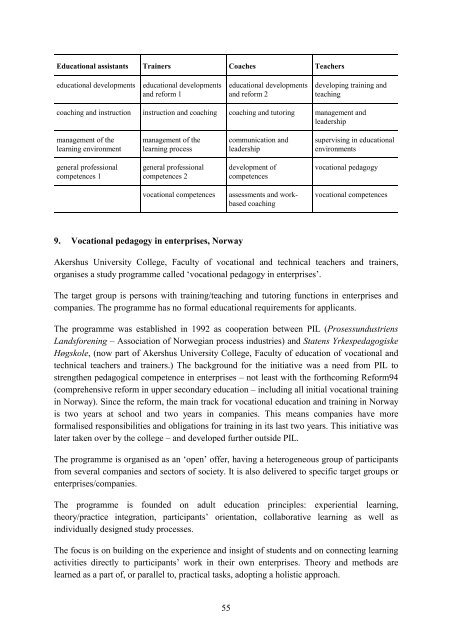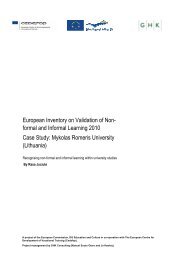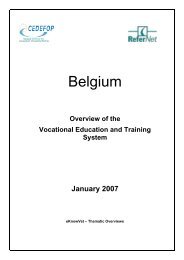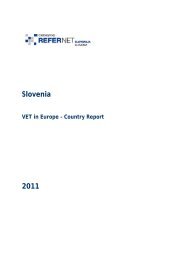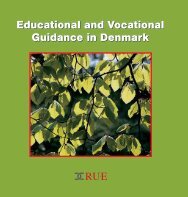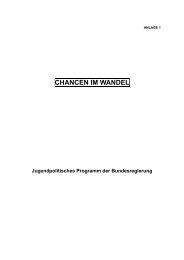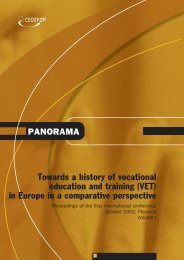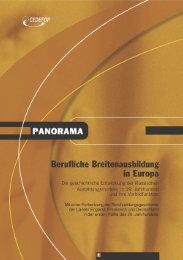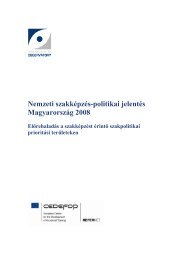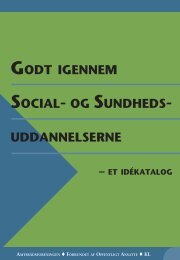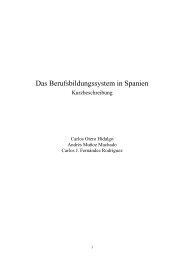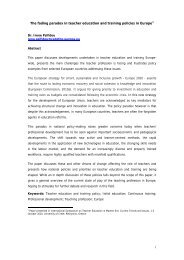PROFF – Professionalisation of VET teachers for the future - Europa
PROFF – Professionalisation of VET teachers for the future - Europa
PROFF – Professionalisation of VET teachers for the future - Europa
You also want an ePaper? Increase the reach of your titles
YUMPU automatically turns print PDFs into web optimized ePapers that Google loves.
Educational assistants Trainers Coaches Teacherseducational developmentseducational developmentsand re<strong>for</strong>m 1educational developmentsand re<strong>for</strong>m 2developing training andteachingcoaching and instruction instruction and coaching coaching and tutoring management andleadershipmanagement <strong>of</strong> <strong>the</strong>learning environmentmanagement <strong>of</strong> <strong>the</strong>learning processcommunication andleadershipsupervising in educationalenvironmentsgeneral pr<strong>of</strong>essionalcompetences 1general pr<strong>of</strong>essionalcompetences 2development <strong>of</strong>competencesvocational pedagogyvocational competencesassessments and workbasedcoachingvocational competences9. Vocational pedagogy in enterprises, NorwayAkershus University College, Faculty <strong>of</strong> vocational and technical <strong>teachers</strong> and trainers,organises a study programme called ‘vocational pedagogy in enterprises’.The target group is persons with training/teaching and tutoring functions in enterprises andcompanies. The programme has no <strong>for</strong>mal educational requirements <strong>for</strong> applicants.The programme was established in 1992 as cooperation between PIL (ProsessundustriensLands<strong>for</strong>ening <strong>–</strong> Association <strong>of</strong> Norwegian process industries) and Statens YrkespedagogiskeHøgskole, (now part <strong>of</strong> Akershus University College, Faculty <strong>of</strong> education <strong>of</strong> vocational andtechnical <strong>teachers</strong> and trainers.) The background <strong>for</strong> <strong>the</strong> initiative was a need from PIL tostreng<strong>the</strong>n pedagogical competence in enterprises <strong>–</strong> not least with <strong>the</strong> <strong>for</strong>thcoming Re<strong>for</strong>m94(comprehensive re<strong>for</strong>m in upper secondary education <strong>–</strong> including all initial vocational trainingin Norway). Since <strong>the</strong> re<strong>for</strong>m, <strong>the</strong> main track <strong>for</strong> vocational education and training in Norwayis two years at school and two years in companies. This means companies have more<strong>for</strong>malised responsibilities and obligations <strong>for</strong> training in its last two years. This initiative waslater taken over by <strong>the</strong> college <strong>–</strong> and developed fur<strong>the</strong>r outside PIL.The programme is organised as an ‘open’ <strong>of</strong>fer, having a heterogeneous group <strong>of</strong> participantsfrom several companies and sectors <strong>of</strong> society. It is also delivered to specific target groups orenterprises/companies.The programme is founded on adult education principles: experiential learning,<strong>the</strong>ory/practice integration, participants’ orientation, collaborative learning as well asindividually designed study processes.The focus is on building on <strong>the</strong> experience and insight <strong>of</strong> students and on connecting learningactivities directly to participants’ work in <strong>the</strong>ir own enterprises. Theory and methods arelearned as a part <strong>of</strong>, or parallel to, practical tasks, adopting a holistic approach.55


